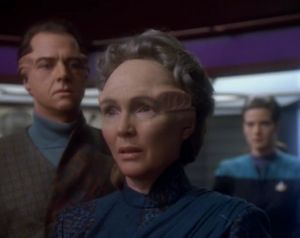| |||||||||||
| |||||||||||
|
Spoiler-free notes: I hope the writers don't continue to pursue this Bashir-can't-get-a-girl subplot, because it runs the risk of turning him into the DS9 equivalent of La Forge. This episode has a lot of guest stars that appear as other characters in the Star Trek universe, including Gregory Itzin, Fionnula Flanagan, Anne Haney, and Richard Lineback. Didn't the writers just use the accused-of-a-crime gambit as a way to explore Odo's character (in "A Man Alone")? I get that it's a good way to ask how well we really know a new character, but using it twice in the span of four episodes strikes me as lazy. The arbiter is using a ball gavel, just like the Klingon one seen in Star Trek VI: The Undiscovered Country. Wouldn't there be several legal precedents within Trill culture for this sort of thing? I agree it's an interesting legal question that can only be raised by sci-fi, but I don't understand why we are expected to believe that it's never been encountered in the Star Trek universe before. When Enina Tandro barges into the hearing and announces that she can vouch for Curzon's whereabouts, it's a deus ex machina in that it short circuits the ethical questions being raised, eliminating any need for closure. It's a cheap escape hatch. It also doesn't make any sense. Enina Tandro admits to having an affair with Curzon, which automatically makes her testimony questionable as she could easily be protecting a guilty Curzon. Granted, self-incrimination is often seen as a boost to credibility, but it shouldn't be so immediately satisfying to the arbiter (much less to Ilon Tandro), and it doesn't nullify the request for a trial. It reminds me of TNG's "A Matter of Perspective," in which Riker's extradition hearing for murder is magically solved to everyone's ridiculous satisfaction by the technobabble-filled hypothesis of La Forge, one of Riker's best friends and colleagues who is treated as though he is perfectly objective and unbiased. TNG has a couple of courtroom drama episodes that are really good, like "The Measure of a Man" and "The Drumhead," so there's nothing particularly wrong with trying to do it again in DS9. However, the similarities between "Dax" and "The Measure of a Man" are way too obvious, and much like the inclusion of Q in "Q-Less," they slow down DS9's aspirations for uniqueness instead of helping to set it apart. "The Measure of a Man" is a much better episode--mostly because it actually deals with the issues being raised instead of just rendering them moot at the last minute--and Picard is a more logical advocate than Sisko. It is necessary to have an episode like this that gets a lot of the Trill rules out in the open so that Dax can develop as a character without the ambiguity getting in the way, but I just don't think they handled it in a way that fits the DS9 laid out in "Emissary." This is pale imitation, not good storytelling. | |||||||||||
|
| |||||||||||
| |||||||||||
|
Copyright ©2013 e. magill. All rights reserved.
|

